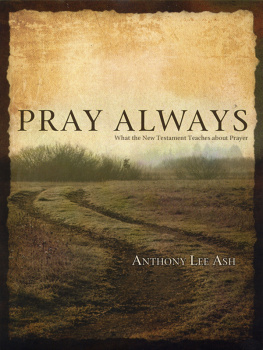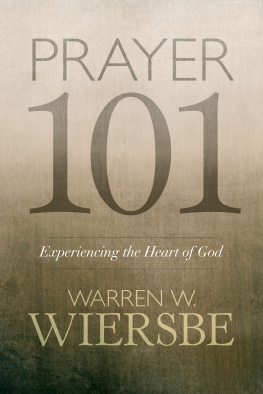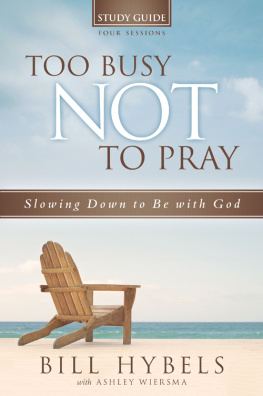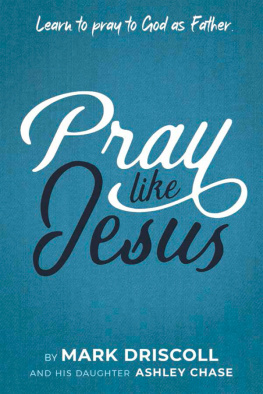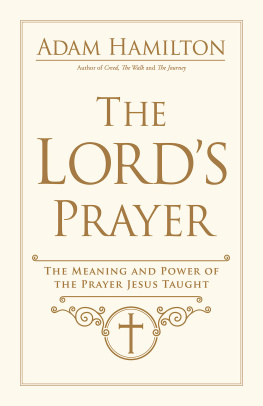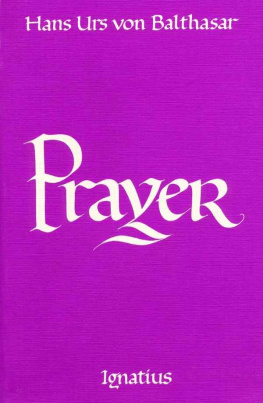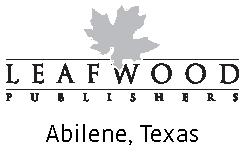Scripture quotations, unless otherwise noted, are from The Holy Bible, New International Version. Copyright 1984, International Bible Society. Used by permission of Zondervan Publishers. Additional quotations from the Revised Standard Version of the Bible, copyright 1946, 1952, 1971 by the Division of Christian Education of the National Council of Churches of Christ in the U.S.A. Used by permission.
This book is dedicated to the hundreds who have heard me speak of these things, and to whose reactions I have listened. Also to my wife, Barbara, whose tough questions help me avoid sloppy thinking.
INTRODUCTION
A Personal Disclaimer
It has been my longtime goal to write this book. Over the years, I have preached many sermons about prayer, taught frequent seminars on the subject, and often counseled prayer for those struggling with problems. Some years ago, I wrote a small book on the subject, intended for adult Bible study classes, which covered prayer texts in the Gospels. I hoped then to follow with a book on prayer texts in the rest of the New Testament. Though that original title is now out of print, some people have been kind enough to tell me it benefitted them spiritually. It certainly had its shortcomings (as the present book, or any book on prayer must), but I felt it at least had some value in filling a tiny place in the void my fellowship was experiencing because of a lack of devotional literature on the subject.
Now I am daring to write the book about which I have thought for several decades. Or trying to write, for I find I am stuck at the beginning stuck, even though the work is outlined in my mind and on paper. I do anything else instead of writing. I arise in the morning full of good intentions, and retire at night vaguely guilty because I made no progress on the project that day. When away from home, I am excited about the project, but when home, I avoid it in any way I can.
Prayer is certainly a prime factor in trying to surmount this barrier. I ask God to help me understand and trust he has given me some insight. I know a partial answer to my paralysis is an innate avoidance of whatever involves prolonged mental effort. Most of us understand that. But I also am embarrassed to offer instruction about prayer to people whose experience of prayer far transcends my own. I take comfort in feeling that I am not alone. Richard Foster confesses a like inadequacy in his book, Prayer: Finding the Heart's True Home. And in his Letters to Malcolm, C. S. Lewis confesses to his imaginary correspondent the pitiful weakness of his own prayer life. As I recall it, Lewis suggests that his letters might cause people to think him a saint, when in reality his prayers were something crowded to the margins of his life. And yet, I cannot compare my prayer life to these two. At least, I don't think I can, though I sometimes wonder just what a prayer is. Is it possible a Christian prays more than just in formal times of prayer? Can a life, or parts of a life, be prayers? I still ponder over that, and will return to the thought later in this book.
There is something else. The more I reflect on the subject, the more complicated it becomes. I am often made aware of this when reading what others have written. Human thought is, at best, severely limited. We are acutely aware of this when we extend it to its highest consideration contemplation of the Almighty. Rebounding from this, we also recognize that powerful praying is being done by saints who are not troubled by such speculations. Is it possible to over intellectualize the whole matter? Perhaps it is, for the tastes of some. Yet our minds are God's gifts, to be used to reflect on him; to abstain from this is a failure of stewardship. So one must plunge ahead into places where the water is too deep, hoping God's grace will empower the strokes, help one avoid the dangers, and show mercy to the swimmer, so that survival, not drowning, is the outcome. Because of the hope that God can use even a highly imperfect offering (as he uses highly imperfect humans), I will pursue the task of writing.
Now that I have written these things I can proceed. But here I find another barrier. Before settling into the part of the book's outline where I feel secure, I want to write about prayers in general terms, and about the assumptions prayer involves. But I also wish to address an issue that troubles many of us: Why, if we know prayer is such a wonderful gift of God, do we not do it? Why, if Jesus pleads with us to ask, seek, and knock, do we not ask, seek, and knock? Why, if our needs are so great, and God's response is so gracious, do we choose not to pray? My dilemma is how to relate the divine promise and human reluctance in a meaningful way. For some of us, the road to a rich prayer life is not easy.
For those who struggle with the smallness of their prayer lives, I confess I have no easy path to improvement. It still must often be grit your teeth and do it, or force the time out of your day, or pray on the run. Why can't our conversations with our Maker be easier, more intimate? I do not know. Some day, I trust, they will be our ultimate desire and glory. For now we are sputtering along. I hope he is pleased with that. I think he is! When we recognize the enormous power tapped through prayer, we must pray as best we can.
For those to whom this problem is foreign and who get along with great success in their prayers, perhaps they need to teach the rest of us. But please don't give us easy answers to difficult problems, and please appreciate our struggles. It isn't that we don't want to pray, or that we fail to recognize our responsibility to do so.
If what we find in this book stirs us to significant reflections on our prayer lives, I will have accomplished one of my goals. If it stirs us to more powerful prayer experiences, I will have accomplished another. We must never forget that in prayer we open ourselves to the working of God's power. No human scale is adequate to measure the infinite possibilities that power can effect. In prayer, we move into a realm whose mysteries inspire our profoundest awe. Whatever we say, in prayer we are touching the edge of something that must always stagger our imaginations. So we proceed boldly, for our Lord has so bidden us, but we also proceed with deepest humility, for he has bidden that as well.
What to Expect in This Book
Let me state a series of governing concerns in this book.
1Prayer is one of God's greatest gifts to his children. We can never overemphasize its importance and power or the need for Christians to pray without ceasing. At the same time, God's gift should be instructed by God's word. Otherwise there is danger of going in wrong directions in our pilgrimage with the Lord. Though volumes have been written about prayer and the many perspectives from which to view it, in this book, I am concerned with demonstrating what the New Testament teaches.

